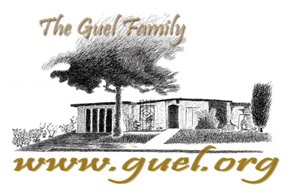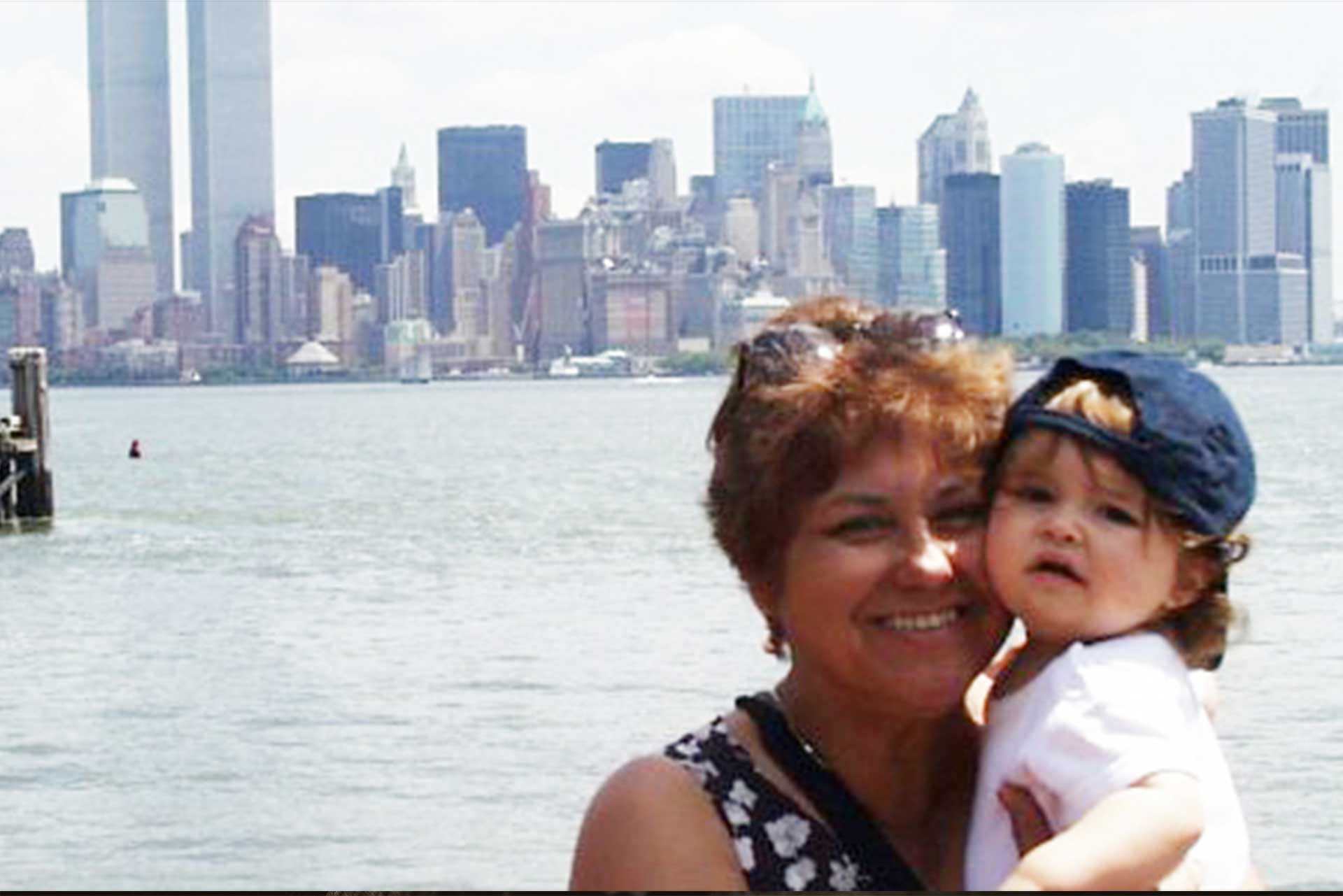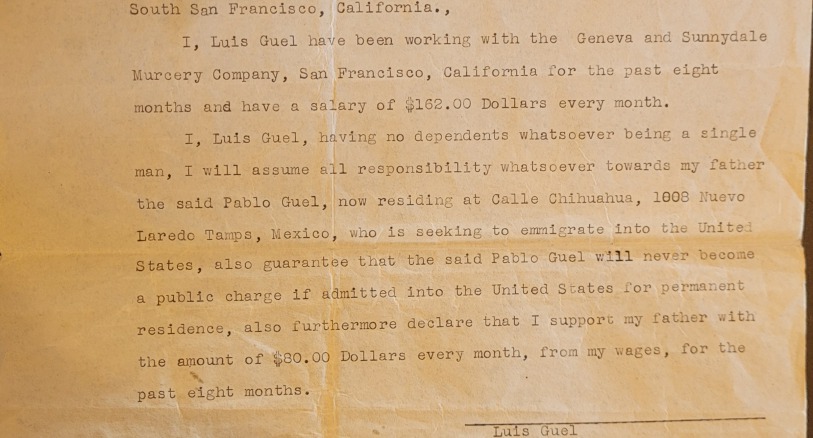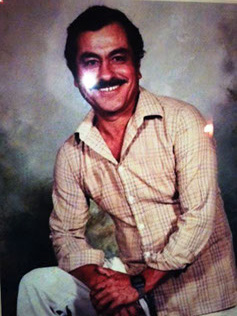Guest author: Elvia Lares is the youngest daughter of Pablo and Carmen Guel. Calamity Rose Jung, her 12-year-old granddaughter, recently wrote the following biography. This is an amazing depiction of Elvia’s life story, told in the first person, and written as true and accurate as it can possibly be, based on questions and conversations they have shared. We’re proud to feature Calamity Rose as an up and coming author in the family!
—

Elvia Lares was born in a straw hut. A small, round, dirt-floored affair, the hut took shape by the beaches of Acapulco. In the tourist Mexico of 1943, an indigenous child’s common treasures were most people’s trash.Elvia’s crib was a hammock, and her toys were empty cartons, bottles, and discarded paper. Born into a full family and extreme poverty, she had nine brothers, a number that was normal at that time.
Her parents met and fell in love during the Depression, when things in the U.S. got so bad that the government began offering people money to go back to Mexico. Poverty was a huge factor in Mexicans, and the government knew this. Elvia immigrated to the U.S. in 1957, when she was fourteen, then carried out a life in the United States.
This is her story.
—
Because they didn’t have much money, my parents took the offer that the government gave and headed back to Mexico with their four children (not including me at that point). My dad got a job working on the construction of the new highway and he moved from town to town, following the work on the road.
That’s how I happened to be born in Acapulco, which is a famous Mexican tourist resort. My siblings were born in various places along the way.
I grew up in an incredibly poor environment, which I consider now to be a valuable experience. I used to play with discarded cartons and bottles, those sorts of things. Therefore, I had to rely on my imagination.

Sometimes the broken bottles cut my hands, but it was never too bad and I would suck on them until they stopped. I used to make my own paper dolls and would spend hours lying on my back in the grass looking at the clouds, trying to make figures out of the crowded, puffy things. I saw the face of my father, a shoe, a duck playing the accordion.
At that time, poverty was everywhere, and schools were missing textbooks and windows. We walked to class with no shoes, and holes in our clothes, but it didn’t matter much to me. In Mexico, I only went to school until seventh grade.
I have always loved my family more than anything; they were always there for me. Our favorite pastime as a family was to light up a bracero (it’s like a barbecue pit, but is used as a heater) and we would gather around. We would tell stories, mostly spooky ones, or turn on the radio, which was a cheap, plastic thing with one speaker, and listen. Sometimes the most comforting sounds in the world were the hiss and spit of the fire, the crackle of the radio, and the creaky voices around the flames that made everyone different shades of orange.
Those were precious moments I will treasure forever. Now, kids are robbed of their imaginations thanks to technology.
It’s a miracle that we all made it to adulthood. Being stung by a scorpion is not something you expect to survive. Especially when you’re six.
We all used to lie on the ground on our tummies to tell stories, and one day, a scorpion stung me on the elbow.
The pain was a pinprick at first. A bee sting. Soon, it went haywire, red hot needles pushing deep into my arm.
In Mexico, you only go to see the doctor if you are going to die, so my mother did the usual thing. She called the neighborhood fix-all nurse.
All the kids believed she was a witch. She must’ve been around a hundred years old, a hunchback, with a red scarf around her scraggly gray hair, and one tooth right in the middle. The poison was a terrible thing to have in your veins. Like something heavy and sharp. Yet, miraculously, the ‘witch’ saved my life.
That brings me to another interesting story. My brother, Pablo, is disabled. When he was little, he suffered from seizures. One day when he was seven, he had a particularly nasty one and passed into unconsciousness, then into death. Fear doused me in icy water.
I was only around six at the time, and I remember the house full of people, including the nurse, and my mother on her knees praying and screaming for God to save him.
The nurse took Pablo by the collar, dipped him in a pail of hot water, then cold water repeatedly, the water sloshing and splashing and sprinkling on the ground and he was coughing and hacking and sputtering and he was alive!
Only thing, when he was dead, his brain wasn’t receiving enough oxygen, and after being that way for a few minutes, he was slow and disabled when he woke up. He’s funny, though, and there’s a twinkle in his eye that makes you wonder if he’s really as slow as people think.
I was always sort of a tomboy. There wasn’t any money or time to concern myself with jewelry, clothing, or boys. Instead, I turned to my family. Throughout my life, I realized how important it is to have family and friends who love you to support you during the rough times.
One of my favorite memories as a child was when my parents left to go to a movie and my brother, Felix, was left in charge of us. My mother had a couple of chickens and because there were so many children, most of our meals were chicken stew or soup. Anything to make it last.
Felix caught and killed one of the chickens and fried it! I thought I had died and gone to heaven; the chicken was crisp, golden, and tender. I had never tasted anything so delicious! Needless to say, he got in trouble and we never had fried chicken again. But I never forgot how good it tasted.
As it turned out, my father was a severe binge drinker who finally succumbed to alcoholism and neglected his family: eleven children and his wife.
Soon after, my brother Luis ran away to escape problems such as not enough money or food, and too many children. He joined the Army and fought in the Korean War.
One day, we received a package from Luis in the Army. He sent us a parachute from all his fighting. Up until then, my mother would make me dresses from flour and potato sacks. I wore burlap dresses. But this time, she made me a beautiful dress out of that parachute! It was soft and billowed about my ankles like a cloud. I may be the only girl who has worn a dress made out of a parachute. Eventually, Luis sent for us, and my family and I set out for a three-day journey to the U.S. in a station wagon.
When I was fourteen, I immigrated to the United States with my family, and my brother’s family, too. We came here legally and in an old station wagon with fourteen people in it. I remember having a small baby on my lap for most of the trip.
It took us around three days to make it from Laredo, Mexico to the U.S. I remember my mother stopping and buying loaves of bread and lunchmeat and passing them around to the younger kids. They were stringy and gummy, but that’s what we ate for three days on the road. There were no fast food places.
We came here January of 1957 and arrived at my sister Ana’s house. It felt clean and brand new, like a shiny, store-bought glass window that had never been touched yet. I remember I was wondering how the people could afford such beautiful houses. We stayed there, at my sister’s, until we bought a house in Santa Clara.
When I made new friends in the U.S. they were amazed at how fun it was to just lay on our backs and make objects appear in the clouds.
—
Four years later.
I was raised very sheltered, and at eighteen, had the mentality of a twelve-year-old. My mother was very strict. I was dropped off and picked up from school, was not allowed to go anywhere except with my parents, and I was eighteen years old! It made me feel like a small child.
Like a dummy, I thought that when I met my ex that it was a chance to get away. Three days after my eighteenth birthday, I eloped and had a baby a year later.
The marriage ended in divorce, which shattered my heart like glass. Even more of a burden than the grief was that I became a single parent with three young children and an all day, every day job to support my family.
In retrospect, I think it would’ve all been better off if I had gone on welfare and stayed home with them, because it would’ve been nice for my children to have at least one parent around. I feel like that about the first part of their lives because they didn’t have that. In a way, it was worse than the poverty in Mexico. If you are poor, with little belongings, and are hungry and thirsty, but you have people who love you with you, isn’t it better than having all you want in America, but no one around?
After a few years, when I was twenty-two, I was hired to work at IBM, which was a computer manufacturing company. I had to sign a paper saying that I would become a citizen as soon as possible.
I started working at the manufacturing line. This is where we would make the parts for the computers and assemble them. I worked at the manufacturing line for about eight years.
Thinking back now, it seems funny to think how things were. The only people in the manufacturing line were women, and the men were the bosses. They told us what to do, when, and where to do it. We were not allowed to wear pants, and had to dress professionally.
IBM opened my eyes. I was unhappily married with three children. Like I told you before, I was very sheltered and naive when I got married, so I hadn’t dated anyone previously.
My husband used to get paid on Fridays. He would party all weekend and come back Monday, and then there was no money left.
I was a very good girl. I did what my husband wanted me to and came up with as much money as possible to make up for his squandering. I believed that everyone else lived the same way. Then came IBM. There, the girls were wild, even though they were married. They liked to party, and I also noticed that their husbands were nothing like mine.
So, after years of abuse and no financial help, I divorced him and went at it alone. I really do believe that if I never would have started working at IBM, I would’ve never done it.
In 1982, I lost a daughter, Alma, in a head-on collision car crash with a drunk driver. It’s hard to talk about it. Alma was only in her early twenties at the time. I was still working third shift at IBM, and I remember: that night, I went in late at about three in the morning. I was upset with her because she wasn’t home yet. She was a single parent and had a boyfriend who would sometimes come over to her house and play cards. I remember driving by her house, but everything was dark.
Right after I got off from work, the manager called me into his office, and I thought it was strange that Robert was there along with my brother Marce and his wife Toni.
“Your daughter, Alma, was in a car crash. I’m sorry.
“She’s dead.”
It felt like a boulder dropped onto my heart, crushing it. I kept telling myself to wake up, that this was just a dream.
Robert and I went home and told my son, Richie, who was, at that time, only twelve years old. He was very close to his sister and it took him a long time to get over it. Alma worked the second shift, so the accident must have happened at about midnight.
After the accident had ripped a gaping hole in our life, we adopted Monica. She was a beautiful young baby with thick black hair and huge brown eyes. She had been Alma’s daughter, but Robert and I decided to adopt her after a couple of years, her dad was in and out of the picture and agreed to let us adopt her when he knew we were going to ask for child support.

I had to get real busy right away in fixing a place for the baby and making arrangements for someone to come and watch her full time. As it turned out, I asked IBM for a leave of absence for a year and was able to stay with her.
Having a new baby in the family was good because it allowed us to go on and focus on her.
When she was about four years old, the judge actually asked her a few questions like, “Do you want these people to be your new parents?”
Monica brought a lot of joy to our family after the devastating death of our daughter and has always been a big part of our lives.
—
After one of my long-time friends, Barbara, died from cancer, I was grieved to lose my friend but also terrified. Up until now, our lives had been parallel to each other: we were married at the same time, divorced at the same time, met our new husbands within weeks of each other and married them the same year, we both lost our first born and raised our grandchild. So, needless to say, I believed that whatever happened to her would eventually happen to me. I remember that icy water feeling. Fear. For weeks, I thought I had cancer. My husband, Robert, thought I was nuts because I had no foundation for this fear other than Barbara.
When I found a spot on my nose, I knew. I went to the doctor and they did a biopsy, but the results were negative. It turned out that I didn’t have cancer, at least not yet.
A couple months later, my doctor was giving me a check-up and found a small lump on my neck. She told me that it looked suspicious, but not to worry, and they’d check back on it in six months. I asked what the worse situation could be. She told me, thyroid cancer, but it was very rare, and even if it was, it was a very slow growing cancer, so not to worry. When I heard that, I told her no. I want to know now, if I have cancer or not.
Her reaction was persistent. She told me that it was extremely rare and not to worry; I didn’t need a check. It was fine. That’s what she said, but I insisted that I had to know. Wouldn’t you have? I don’t think I would’ve been able to sleep with the mystery of whether I had cancer or not eating me up inside.
The biopsy came back positive. It was thyroid cancer all over. The doctor who did the biopsy told me that the doctor who had performed my checkup was very smart. ‘Normally, a doctor wouldn’t check on this.’ I told him, ‘My doctor? Heck, it was me!’
But it was a very scary time for me. The doctors thought they were only going to remove part of my thyroid, but when they went in, they found other lumps, and they had to take my entire thyroid out. Your thyroid gland produces a lot of your body hormones, so from then on I had to take lots of medication. It was a very scary time.
I was recuperating from surgery when the bombing of the twin towers occurred, so I will always associate the incident with my cancer.
—
I suppose my life was rough. I had to deal with a lot of tough things when I was a kid and an adult. I used family as a raft in the stormy sea of my life, but there was another one that I turned to. More than a raft. A boat. Music.
I always have the stereo on rather than the television. But it wasn’t just something I listened to. Not just something extra. Music helped me through life.
Something sweet, something country, something old, something Mexican. Those kinds of music are my favorite. They get me through lots of tough times. Sometimes when I’m sad or things are going on, I put my favorite music on and it cheers me up and brightens my day. I also enjoy dancing. I have been told that I am a very good dancer, which may be because my brother Luis became a dance instructor in his later years and he taught me how to dance ballroom, like swing and salsa. My husband and I still go dancing around six times a year. I love the feeling that fills me up when I dance, a sparkling, wonderful feeling, like I drank warm seltzer.

I play the guitar and I try to sing along but my voice is not that great, so I enjoy playing more than singing. I belong to a Senior Citizens guitar group that meets every Wednesday and Friday. We have a teacher that makes us practice. There are about ten people in our group and we have around five that have beautiful voices, so we accompany them while they sing. We also meet regularly for parties or potlucks and we end up playing the guitar or singing karaoke.
—
Author’s Note:
Before you close this page, imagine Elvia Lares after everything. After the music, the aimless days staring at the clouds, the scorpion, the loss, the pain, injustice, love. After the burlap dresses.
Imagine her brown, swirling hair, her fingers dancing across the guitar frets, pressing and tapping and strumming. Imagine her beautiful, rich, cancer free voice, her wonderful singing filling you up like hot chocolate. Imagine my grandmother, sixty-eight years old. A lady with experience, a lady with a sparkle in her eye, prestige, a lady who’s seen it all.
Fists in the air, a lady who made it!
~Calamity Rose Jung, 2012



